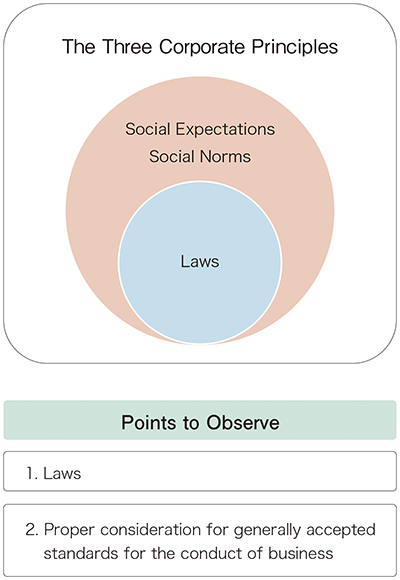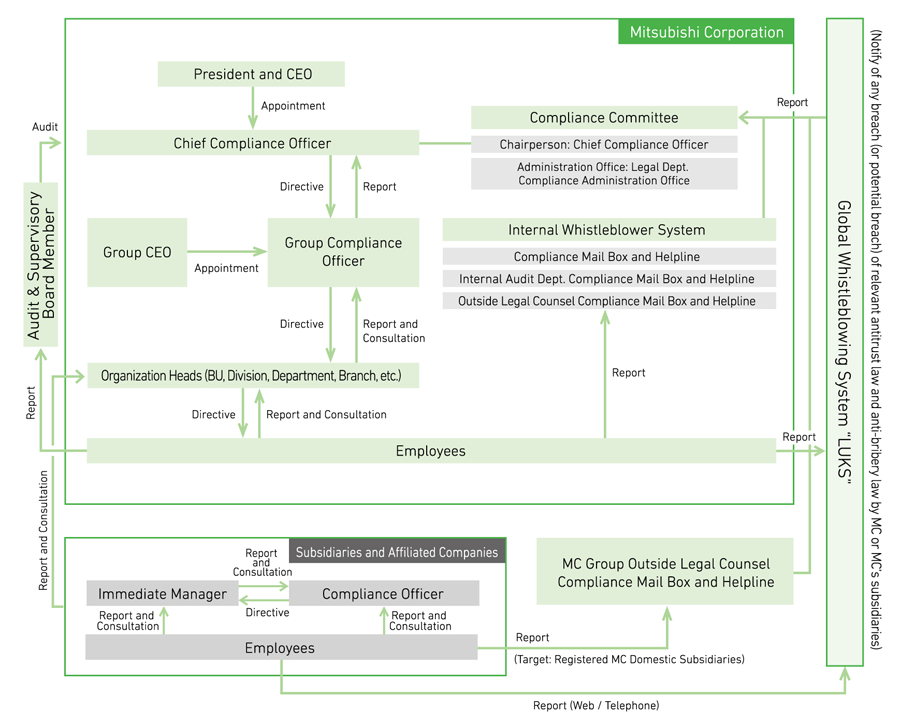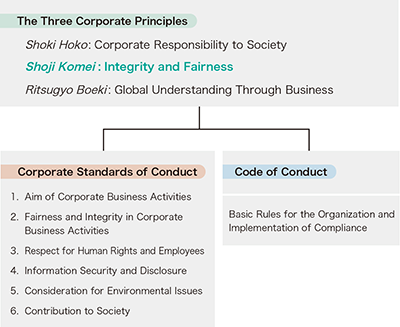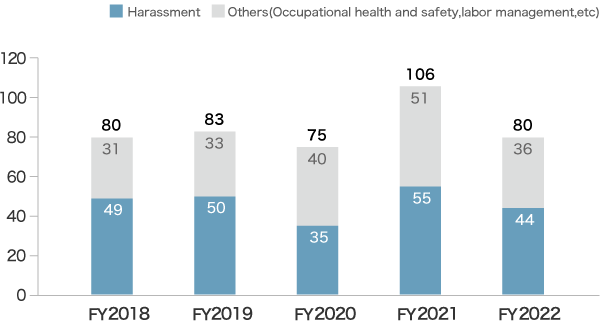Within MC, "compliance" is defined as an observance of laws, rules, regulations, international standards and internal regulations, as well as respect for generally accepted standards for the conduct of business. In addition to 1) observance of laws and regulations, all officers and employees at the MC Group must also 2) respect generally accepted standards for the conduct of business. Officers and employees must consider at all times what these standards entail in the present-day context and in the applicable regions, as there are no clearly stated rules in this regard. Officers and employees are aware of the high expectations of society and aim to ensure that the MC Group remains trusted by society.


三菱商事の社内規程

Mitsubishi Corporation Internal Rules and Regulations
At MC, the Compliance Committee and the Compliance Officer systems play important roles in the implementation of compliance programs. As an advisory body to the Chief Compliance Officer, the Compliance Committee reports on and discusses major compliance incidents that occur within the MC Group, leading to the regulation and communication of appropriate measures. The Committee is led by the Chief Compliance Officer, who is appointed by the President, and meetings are held twice a year, in principle. Matters reported to and discussed at the Compliance Committee are reported to the Executive Committee and the Board of Directors once a year. The Chief Compliance Officer is in charge of all compliance matters of the entire MC Group, and is responsible for planning and implementing compliance programs. The Chief Compliance Officer also has the authority to conduct necessary investigations in the event of a breach or potential breach of compliance, and can also order the suspension or change of business activities to prevent or remedy a breach or potential breach. In addition, MC has senior executives in the corporate section and in each Business Group at the Head Office as Compliance Officers. Each Compliance Officer has the authority to implement compliance programs in a manner tailored to the characteristics of each section and Group. Under the supervision of the Chief Compliance Officer, each Compliance Officer, who is a management executive, implements various measures to prevent recurrence of violations, and is responsible for improving ethical conduct and preventing bribery and corruption.
Compliance Framework

Officers and employees of MC are required to report to or consult with their superiors/managers or other personnel relevant to the matter, including compliance personnel, if they become aware of a breach or potential breach of compliance. The managers of organizational bodies must in turn report to or consult with the Compliance Officer of their section or Group, who is then required to report to the Chief Compliance Officer. Furthermore, cases of violations and the status of resolutions reported to the Chief Compliance Officer, including those of Group companies, are also reported to Audit & Supervisory Board Members. The relevant Compliance Officer must conduct necessary investigations of the reported or consulted matter with the due care of not infringing the human rights and dignity of concerned parties, and will formulate and implement necessary preventive measures and remedies. The result of the investigations and preventive measures/remedies implemented by the Compliance Officer is reported to the Chief Compliance Officer and used to plan and implement compliance programs for the entire MC Group as lessons learned from the matters.
In addition, MC has a dedicated organization within the Legal Department called the "Administration Office for the Compliance Committee" which supports the Chief Compliance Officer in handling compliance cases, and both plans and implements MC Group compliance programs in cooperation with each Compliance Officer and the relevant departments.
MC’s core philosophy is the Three Corporate Principles. Beneath this are the Corporate Standards of Conduct, which govern MC as a company, and the Code of Conduct for Executives and Employees, which applies to each executive and employee. The Code of Conduct's basic philosophy is expressed as follows: "In conducting business, MC executives and employees shall comply with laws and regulations, international agreements, and internal rules, observe business manners, and act responsibly in accordance with social norms." At MC, compliance is not limited to simply complying with laws. It is also based on the principle that any action that violates social norms, even if it is not illegal, should not be conducted.
In order to promote the Code of Conduct internally, MC has also printed it in the Pocket Employee Handbook. In addition to the specific points to uphold, instructions on how to access the Meyasubako (Compliance Mail Box and Helpline) for consultation on compliance issues are also listed. MC executives and employees can check the content at any time by sending icons to company cell phones or posting a PDF on the company website. Furthermore, an e-learning program that included case studies related to the Code of Conduct is conducted every year. At the end of the e-learning program, all officers and employees submit a written pledge saying that they will comply with the Code.
Mitsubishi Corporation Internal Rules and Regulations

In order to have an effective compliance program in place and to ensure accessibility to MC's compliance philosophy and rules, MC has established various compliance-related internal regulations under the Three Corporate Principles, the Corporate Standards of Conduct and the Code of Conduct. These internal regulations are reviewed every year to reflect amendments to the laws and regulations and changes in the business environment and other conditions surrounding the MC Group.
All reports regarding the facts, causes and preventive measures and remedies of each compliance incident are shared with the Administration Office for the Compliance Committee, and are used for conducting case analyses and risk assessment, and planning compliance programs and measures.
We see employee engagement as the most important factor in our efforts to develop a dynamic spirited, and vibrant talent pool and organization through human resource policies linked to our management strategies. In line with this philosophy, we began to conduct a yearly Employee Awareness Survey in FY2022 with the aim of regularly monitoring and enhancing our organizational culture. One of the Group’s KPIs is the maintenance of positive response rates of at least 65% for both the employee engagement rate and employee enablement rate in the Employee Awareness Survey. Employees receive feedback about the survey results so that they can use this information to make improvements in their own organizations. At the management level, we analyze and discuss these survey results, identify issues that need to be addressed on a companywide level, and reflect our findings in policies. For example, in FY2023 we took steps to raise productivity by improving business process efficiency through Groupwide business process reforms based on our analysis of the results of the Employee Awareness Survey. The aim of these reforms is to create business environments in which our human resources can focus on value creation activities.
MC conducts periodic self-assessments of the compliance risks to which special attention should be given for each of its businesses and subsidiaries, such as risks relating to anti-trust violations, bribery and corruption, and occupational health and safety, taking into consideration industry, product, and regional characteristics. Compliance Officers of each Business Group analyze risk factors that require special attention related to their Business Group and implement risk response measures. Each subsidiary also appoints a person responsible for compliance matters (i.e. Compliance Officer of subsidiaries), who analyzes risk factors related to respective business areas, and implements risk response measures.
Utilizing the PDCA cycle, MC implements necessary measures, such as conducting various seminars and adopting regulations, to address the compliance risks identified from the results of the various surveys, reports and monitoring, as well as taking into consideration the opinions of the Compliance Officer of each Business Group. The results are further monitored, and an analysis of the results is reflected in the further identification and evaluation of risks. The aim is to improve the awareness and knowledge of compliance among all officers and employees by repeatedly and rigorously educating and training them.
MC has established the “Code of Prohibition against Improper Payments or Other Types of Benefits” in order to prevent provision of improper benefits to domestic and foreign public officials, etc. (including persons who are deemed to be public officials under applicable laws, etc.), and prevent conducts from being seen as suspicious or untrustworthy by third parties. MC also complies with the anti-bribery laws and regulations of various countries, including Japanese criminal law and the Unfair Competition Prevention Act, the U.S. Foreign Corrupt Practices Act and the U.K. Bribery Act. The MC Code of Conduct stipulates definitions and compliance requirements for bribery, conflicts of interest, and other forms of misconduct. No bribery risks have as yet been assessed as high risk. Furthermore, MC has established a strict anti-corruption system and pre-approval process by setting detailed guidelines regarding the provision of entertainment or gifts to public officials, etc., and regarding the appointment of agents/intermediaries, etc. In addition, MC has established internal anti-corruption regulations requiring detailed due diligence when accepting workplace experience training for relatives of public officials, etc., as well as providing donations to government and public officials. We have also introduced guidelines to conduct anti-corruption due diligence on our business and other partners. MC continuously and periodically reviews and improves its internal rules and regulations taking into account the trends of the enforcement and proceedings brought by anti-corruption regulators, and anti-corruption programs/measures taken by other companies.
In 2016, aiming to build a more effective anti-corruption system, MC conducted a thorough assessment by external experts regarding its entire anti-corruption systems. Utilizing the experts’ evaluations and recommendations, MC is committed to continuously improving its anti-corruption systems and ensure that they operate effectively. Moreover, in 2016, MC created the Anti-Corruption Handbook to provide accurate information about anti-corruption, including information about laws and regulations, and enforcement cases relating to the bribery and corruption in major countries. The handbook also explains MC’s programs, systems and other initiatives to prevent bribery and corruption. The handbook has been distributed throughout the MC Group. In FY2022, the handbook is being updated and made available on the Company website.
In 2019, MC adopted a risk-based anti-corruption system that devotes appropriate attention and resources depending on the types and scales of transactions and the level of corruption risks in applicable countries, and revised relevant guidelines accordingly to build a system to prevent bribery/corruption on a consolidated basis. Appropriate approval procedures and record management are carried out in accordance with these rules and guidelines, and the rules and guidelines are reviewed at the end of each fiscal year and revised as necessary. At the time of the review in FY2020, MC clearly stated that interested parties are excluded from the investigation of whistleblowing cases and clarified the definition of “public officials” etc. and the definition of “improper benefit” in anti-bribery cases. Through the implementation of these rules and guidelines, MC is working to deter compliance violations and limit opportunities for unethical behavior, such as prohibiting contact with related public officials, etc.
In FY2022, there were no bribery or corruption cases which had a significant impact on the MC Group.
In addition to preventing corruption by officers and employees, MC established internal regulations to prevent corruption by any agents, consultants, intermediaries, etc. retained by MC (hereafter collectively referred to as “Agents”). The internal regulations require officers and employees to obtain prior approval from the relevant Compliance Officer to retain suitable Agents. From FY2019, MC introduced new internal approval procedures for retaining Agents on the basis of the risk based approach depending on the nature of the relevant services to be provided by the Agents, the size and purpose of projects, and the level of risks, including the level of the corruption risk of the relevant countries. These procedures are reviewed annually.
In 2015, MC established and published “Mitsubishi Corporation’s Anti-Corruption Guideline” in order to inform business partners of MC’s basic principles related to the prevention of corruption. In the Guideline, MC explains its anti-corruption policies and initiatives as "MC's commitment" and expects business partners to adhere to MC’s anti-corruption initiatives. In April 2019, in order to further strengthen its anti-corruption initiatives, MC expanded the scope of the Guideline to cover the entire MC Group and announced the new “Mitsubishi Corporation Group’s Anti-Corruption Guideline.” The new Guideline not only includes commitments of the MC Group, but also requests that all business partners and clients (including suppliers) of MC Group prohibit bribery, inform anti-corruption policies, and cooperate with investigations when there are concerns about violations.
In FY2022, there were no corruption cases detected in MC. As a result, no fines or financial penalties relating to the corruption were incurred.
MC has established internal whistleblowing systems, known as the “Meyasubako (Compliance Mail Box and Helpline)” (①). These systems are used to report or consult on any compliance-related questions or issues, including workplace misconduct and harassment, violations of laws and regulations, as well as bribery and corruption. Reports to the Meyasubako are sent directly to the Administration Office for the Compliance Committee. MC has also established whistleblowing reporting routes to the Internal Audit Dept. (②) and the Audit & Supervisory Board Members (③). In addition, MC has established a whistleblowing reporting route connecting to outside legal counsel (called the “Bengoshi Meyasubako (Outside Legal Counsel Compliance Mail Box and Helpline)” (④) for officers and employees who wish to remain anonymous. While the outside legal counsel will confirm whether the informant is an officer or employee of MC, they will not reveal the informant’s name or the section to which the informant belongs to the Administration Office for the Compliance Committee without the informant’s consent. For officers and employees of MC Group companies, there is another whistleblowing reporting route called the “MC Group Legal Counsel Compliance Mail Box and Helpline” (⑤). Furthermore, in 2016, MC established a new whistleblowing system for anti-trust and corruption issues called “Let Us Know System (LUKS)”, which is available to officers and employees of MC and its domestic and overseas subsidiaries 24 hours/day and 365 days/year in multiple languages (Japanese, English, French, Spanish, Chinese, Thai, Indonesian, etc.) (⑥).
Our internal regulations clearly stipulate that we will protect the anonymity and confidentiality of the informant and the report content, uphold the informant’s rights, and prohibit retaliation or disadvantageous treatment towards the informant. Violation of these regulations may result in disciplinary action. Moreover, when investigating the reported matters, MC is sure to avoid any conflicts of interest. MC has also established a system to comply with the whistleblower protection laws of each country, including the Whistleblower Protection Act in Japan.
After receiving details of a whistleblowing report, the Administration Office for the Compliance Committee will share the information only with limited number of personnel who need to know the content to conduct the investigation and take related action. Every year, we invite outside instructors to provide training to those in charge of investigating and responding to whistleblowing reports on how to handle and investigate the reports and points to keep in mind. Although we have set up multiple whistleblowing reporting routes in FY2020, we engaged external experts to assess the effectiveness of our whistleblowing systems and their operation. In FY2022, in accordance with the revision of the Whistleblower Protection Act, MC revised its whistleblower standards, distributing a response manual to those in charge of investigating and responding to whistleblowing cases, and conducting video training for all officers and employees in Japan. With regard to management-level harassment training, MC conducts internal training aimed at general managers, team leaders and other levels. MC is working to prevent harassment by introducing case studies. Furthermore, each of the following is well-publicized internally: (1) the prohibition of harassment is stipulated in the Code of Conduct; (2) basic policies, pamphlets and other resources have been produced to prevent harassment; and (3) the Whistleblowing Systems as well as the Human Rights Consultation Desk in the Human Resources Department have been established.
In FY2022, there were no whistleblowing reports which had a significant impact on the management of the MC Group.
Compliance Framework

In FY2022, MC received a total of 80 reports, including Whistleblowing Reports to MC Group companies, of which 44 were related to harassment and 36 were related to other issues (occupational health and safety, labor management, etc.).
In FY2022, no reported cases had a significant impact on the management of the MC Group.
Number of reports received through Whistleblowing Systems

Every year, the Board of Directors supervises the development of relevant internal rules and regulations including the Code of Conduct for Officers and Employees, the progress of various training programs compliance matters such as anti-corruption initiatives, the results and status of compliance violation cases, and the compliance programs and measures to be implemented in the current fiscal year. In addition, both Independent Directors and Independent Audit & Supervisory Board Members receive reports twice a year regarding compliance activities, so that they can provide more effective supervision from their external perspectives.
MC conducts in-house training programs on a companywide basis according to each level in the organization. Compliance-related training is offered on individual topics such as antitrust laws, the Subcontract Act, prevention of bribery and corruption including anti-bribery laws, and labor management. In FY2022, MC held a total of more than 100 in-house legal and compliance seminars worldwide, with a cumulative total of approximately 6,000 participants. Furthermore, tailored seminars are held for each Business Group and region. MC has also created an e-learning program related to the MC Code of Conduct based on the latest developments and case studies on topics such as harassment, bribery and whistleblowing systems. MC reviews the permeation and effectiveness of compliance based on the MC Code of Conduct by requiring all MC officers, employees, advisors, part-time employees, secondees and temporary staff to complete this e-learning program on an annual basis.
In 2013, MC began holding compliance discussions in which small groups of employees in each workplace discuss compliance issues that could occur in the workplace as well as other day-to-day concerns. These discussions serve as a means of supplementing conventional training, which tends to be a one-way form of communication, and improving the compliance awareness of every officer and employee. By facilitating these types of discussions about familiar topics in each workplace, every employee will recognize that compliance is something that is connected to them personally, which will in turn gradually increase their compliance awareness. MC has been conducting the same discussions at least once a year, with the participation of essentially all employees at all levels of every internal organization, including overseas offices since 2013, and MC has also expanded this initiative to over 100 domestic and overseas subsidiaries.
In addition to providing training opportunities and the e-learning program, MC has created a Compliance Handbook that presents a collection of the latest case studies in a Q&A format. The aim of this booklet is to resolve any doubts about the compliance duties of officers and employees that they may have on a daily basis, and MC distributes the booklet to all officers and employees. The Compliance Handbook was updated in FY2022 and is available through the MC intranet. MC also recommends and practices using the handbook as a reference for compliance discussions.
The total number of violations at the Head Office, domestic and overseas branches and offices, and domestic and overseas subsidiaries and affiliated companies that were reported in FY2022 was 159. There were no compliance violations that had a significant impact on the management of the MC Group.
If MC presently owes debt (legal or constructive) as a result of past incidents, is likely to be required to pay such debt, and a reliable estimate of the amount of such debt (penalties, settlement amount etc.) can be made, MC must record provisions for such debt. In FY2022, there were no significant provisions requiring separate disclosure in its financial statements.
MC conducts tax affairs in accordance with the following basic principles.